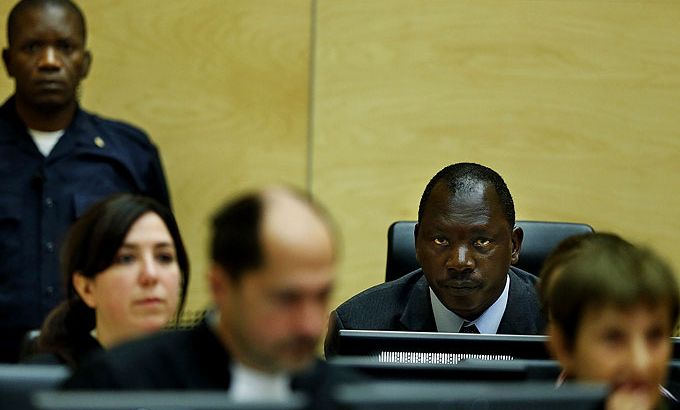ICC jails DRC warlord over child soldiers
DR Congo’s Thomas Lubanga given 14 years in International Criminal Court’s first-ever sentencing in decade of operation.

The International Criminal Court handed down a 14-year jail term to Congolese warlord Thomas Lubanga in its first-ever sentence, after Lubanga’s conviction for using child soldiers in a brutal conflict in the central African country.
“Taking into account all the factors… the court sentences Mr Lubanga to 14 years in prison,” presiding Judge Adrian Fulford told The Hague-based court, set up in 2002, on Tuesday.
Lubanga, who has been detained in The Hague since March 2006, will however effectively only spend eight years in prison. Fulford said the court had taken into account the time Lubanga has already spent behind bars.
Lubanga, 51, was convicted in March of war crimes, specifically for using child soldiers in his rebel army in the Democratic Republic of Congo in 2002-03. Criticised for its slow progress, Lubanga’s sentence marks the ICC’s first since it started work a decade ago.
Alpha Sesay, the legal officer for International Justice at the Open Society Justice Initiative, a foundation that promotes human rights and accountability for international crimes spoke to Al Jazeera.
|
“These children were told to kill and rape. That was the education [Lubanga] gave these children “ – Former ICC chief prosecutor, Luis Moreno-Ocampo |
He said that the judge considered a range of issues, but they also considered mitigating circumstances, as Lubanga had cooperated with the proceedings.
“So the prosecution did not get what they asked for,” said Sesay. “There was dissenting opinion though with one of the judges saying that the sentence disregards the arms so far during the conflict in the Ituri region.”
The Hague-based court’s former chief prosecutor Luis Moreno-Ocampo, who has since handed over this position to Gambia’s Fatou Bensouda, earlier this month called for a 30-year sentence against Lubanga, saying his crimes were “of the most serious concern for the international community”.
“These children were told to kill and rape. That was the education [Lubanga] gave these children,” said Moreno-Ocampo.
During the trial, prosecutors told how young girls served as sex-slaves, while boys were trained to fight.
Significant ruling
Lubanga was found guilty of abducting children as young as 11 and forcing them to fight and commit atrocities in the DRC’s northeastern gold-rich Ituri region. NGOs site some 60,000 people killed in the war since 1999.
Al Jazeera’s Peter Greste, reporting from Goma in the DRC said that Lubanga was a Hema and was seen by the Hema as a protector of their community, but it was “not necessarily a war over ethnicity, this was a conflict over the vast gold reserves in the Ituri region, from which a lot of people suffered.”
“Certainly people particularly the Ituri region recognise that this is the very first time that we have ever seen anybody held to account because of the crimes committed in Eastern Congo.”
At the time of Lubanga’s conviction in March, Moreno-Ocampo said he would be ready to accept a lesser sentence of 20 years should Lubanga “sincerely apologise” and actively engage in helping “to prevent further crimes”.
He pleaded not guilty and has maintained his innocence, adding at a June 13 hearing to discuss his sentence that the court’s decision to find him guilty of war crimes hit him “like a bullet in the face”.
“I am being presented as a warlord… but I never accepted or tolerated such enlistments taking place”.
Lubanga, who has been detained in The Hague since 2006 is the founder of the Union of Congolese Patriots and commander of its military wing – the Patriotic Forces for the Liberation of Congo.
So far Lubanga’s team has not indicated whether they would appeal his conviction, sentencing or both.
Other ICC cases
The ICC – the world’s only independent, permanent tribunal to try genocide, war crimes and crimes against humanity – has issued four arrest warrants for crimes in the DRC since opening its doors in 2003.
Two militia leaders, Germain Katanga, 34, and Mathieu Ngudjolo Chui, 41, who fought against Lubanga, are currently facing trial on similar charges.
Former UPC leader Bosco Ntaganda, a Lubanga ally, is also wanted by the DRC for his role as the leader of a group of mutineers known as the M23 movement.
The ex-general and 13 of his deputies, still to be arrested and face the Hague-based court on war crimes charges, were dismissed from the DRC army before they went on to violently claim a mineral town along the border with Uganda as recently as Friday. Ntaganda and the M23 fighters are still caught in an ongoing struggle with the government.
The ICC is investigating seven cases, all based in Africa.
Six countries – Austria, Belgium, Britain, Finland, Mali and Serbia – have indicated their willingness to accept prisoners sentenced by the ICC.